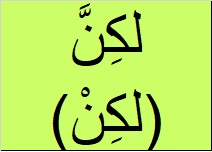
#1. Inna ? verily, truly
قَالُوا سُبْحَانَكَ لَا عِلْمَ لَنَا إِلَّا مَا عَلَّمْتَنَا إِنَّكَ أَنتَ الْعَلِيمُ الْحَكِيمُ
They said, “Exalted are You; we have no knowledge except what You have taught us. Indeed, it is You who is the Knowing,1 the Wise.”(2.32)

#2. Kanna ? as if
وَلَمَّا جَاءَهُمْ رَسُولٌ مِّنْ عِندِ اللَّهِ مُصَدِّقٌ لِّمَا مَعَهُمْ نَبَذَ فَرِيقٌ مِّنَ الَّذِينَ أُوتُوا الْكِتَابَ كِتَابَ اللَّهِ وَرَاءَ ظُهُورِهِمْ كَأَنَّهُمْ لَا يَعْلَمُونَ
And when a messenger from Allah came to them confirming that which was with them, a party of those who had been given the Scripture threw the Scripture of Allah [i.e., the Torah] behind their backs as if they did not know [what it contained].(2.101)

#3. In ? if
قُلْ إِنِّي أَخَافُ إِنْ عَصَيْتُ رَبِّي عَذَابَ يَوْمٍ عَظِيمٍ
Say, “Indeed I fear, if I should disobey my Lord, the punishment of a tremendous Day.”(6.15)

#4. Anna ? that
أَوَلَا يَعْلَمُونَ أَنَّ اللَّهَ يَعْلَمُ مَا يُسِرُّونَ وَمَا يُعْلِنُونَ
But do they not know that Allah knows what they conceal and what they declare?(2.77)

#5. An ? that
وَإِذْ أَوْحَيْتُ إِلَى الْحَوَارِيِّينَ أَنْ آمِنُوا بِي وَبِرَسُولِي قَالُوا آمَنَّا وَاشْهَدْ بِأَنَّنَا مُسْلِمُونَ
And [remember] when I inspired to the disciples, “Believe in Me and in My messenger [i.e., Jesus].” They said, “We have believed, so bear witness that indeed we are Muslims [in submission to Allah].”
(5.111)

#6. A’sa ? possibly
قُلْ عَسَى أَن يَكُونَ رَدِفَ لَكُم بَعْضُ الَّذِي تَسْتَعْجِلُونَ
Say, “Perhaps it is close behind you [i.e., very near] – some of that for which you are impatient.(27.72)

#7. Lakinna ? but, however
وَإِذَا قِيلَ لَهُمْ آمِنُوا كَمَا آمَنَ النَّاسُ قَالُوا أَنُؤْمِنُ كَمَا آمَنَ السُّفَهَاءُ أَلَا إِنَّهُمْ هُمُ السُّفَهَاءُ وَلَكِن لَّا يَعْلَمُونَ
And when it is said to them, “Believe as the people have believed,” they say, “Should we believe as the foolish have believed?” Unquestionably, it is they who are the foolish, but they know [it] not.(2.13)

#8. lamma ? when
وَلَمَّا بَلَغَ أَشُدَّهُ وَاسْتَوَى آتَيْنَاهُ حُكْمًا وَعِلْمًا وَكَذَلِكَ نَجْزِي الْمُحْسِنِينَ
And when he attained his full strength and was [mentally] mature, We bestowed upon him judgement and knowledge. And thus do We reward the doers of good.(28.14)

#9. Iyya ? alone
إِيَّاكَ نَعْبُدُ وَإِيَّاكَ نَسْتَعِينُ
You (Alone) we worship, and you (Alone) we ask for help (for each and everything).(1.5)

#10. Laa’lla ? perhaps, may be
قُل لَّا يَسْتَوِي الْخَبِيثُ وَالطَّيِّبُ وَلَوْ أَعْجَبَكَ كَثْرَةُ الْخَبِيثِ فَاتَّقُوا اللَّهَ يَا أُولِي الْأَلْبَابِ لَعَلَّكُمْ تُفْلِحُونَ
Say, “Not equal are the evil and the good, although the abundance of evil might impress you.” So fear Allah, O you of understanding, that you may be successful.(5.100)

#11. lav ? if
وَمَا هَذِهِ الْحَيَاةُ الدُّنْيَا إِلَّا لَهْوٌ وَلَعِبٌ وَإِنَّ الدَّارَ الْآخِرَةَ لَهِيَ الْحَيَوَانُ لَوْ كَانُوا يَعْلَمُونَ
And this worldly life is not but diversion and amusement. And indeed, the home of the Hereafter – that is the [eternal] life, if only they knew.(29.64)

#12. Ya , Ya ayyuha ? O!
وَإِذْ قَالَ لُقْمَانُ لِابْنِهِ وَهُوَ يَعِظُهُ يَا بُنَيَّ لَا تُشْرِكْ بِاللَّهِ إِنَّ الشِّرْكَ لَظُلْمٌ عَظِيمٌ
And ˹remember˺ when Luqmân said to his son, while advising him, “O my dear son! Never associate ˹anything˺ with Allah ˹in worship˺, for associating ˹others with Him˺ is truly the worst of all wrongs.”
(31.13)
Results
Well done!!!
Nice try!!!!
Verb Practice



